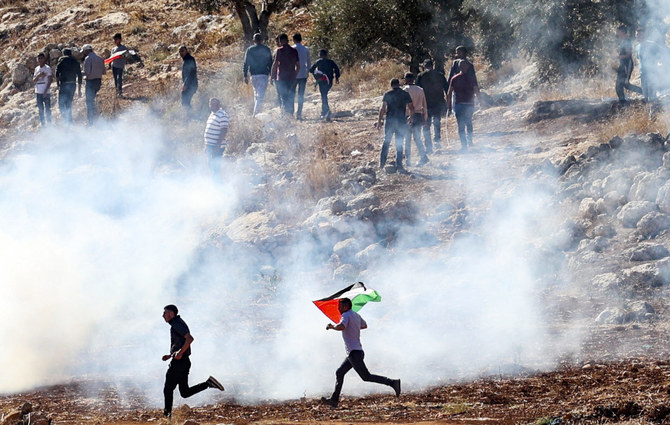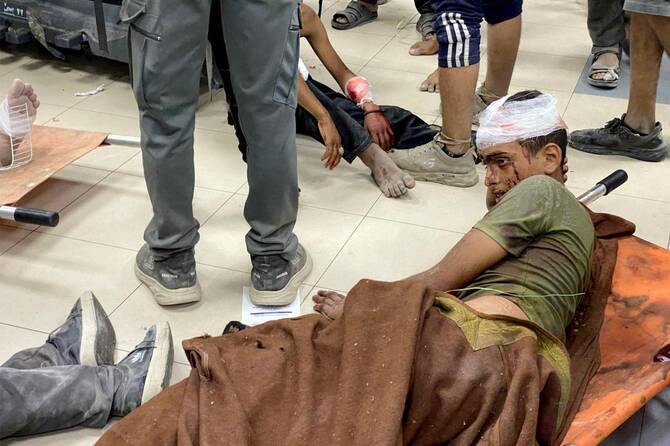JERUSALEM: A 13-year-old Palestinian was shot and fatally wounded on Friday by Israeli troops in the occupied West Bank, the Palestinian Health Ministry said.
It said Mohammed Daadas died in hospital after being shot in the stomach during clashes between Palestinian protesters and Israeli forces in Deir Al-Hatab village, east of Nablus.
The Israeli military did not immediately comment on the report.
Two other Palestinians were injured Friday in clashes in Beita, another West Bank village where locals have struggled for months to dislodge Israeli settlers and the military from a hilltop.
The clashes come days after Israel announced it would advance plans for 3,000 more homes for Jewish settlers in the West Bank, despite international criticism.
Israel has also advanced plans to build about 1,300 homes for Palestinians in the West Bank, but critics see the move as an attempt to parry global condemnation of settlement construction.
Palestinians eye the West Bank as part of a future state, while hard-line Israelis including Prime Minister Naftali Bennett say it is a heartland of Jewish history.
Israel seized the West Bank and east Jerusalem in the 1967 Middle East war.
Hundreds of thousands of Israelis have since moved into settlements that most of the international community regard as illegal.
Bennett has ruled out formal peace talks with the Palestinian Authority, saying he prefers to focus on economic improvements.
Bennett, a hard-line former settler, presides over a motley alliance of fellow nationalists, centrists, liberals and the first Arab party to ever sit in an Israeli government.
Israeli MPs approved the government’s two-year budget on Friday, bringing stability to a shaky coalition of ideological opposites that would otherwise have collapsed, returning Israel to years of political turmoil.
“The budget we passed last night is excellent! I am mostly proud that it brings us a true and timely response to the needs of Israel 2022,” Bennett tweeted after the package was approved.
The coalition needed to pass a budget by Nov. 14 to avoid a fifth election in three years.
None of the 61 members of the coalition defected through nearly 36 straight hours of voting.
Roughly 600 separate votes on individual spending measures were required to pass the budget that sets expenditure for this year at 609 billion shekels ($194 billion) and for next year at 573 billion shekels.
Speaking on Thursday after the approval of the 2021 measures, Bennett boasted: “After years of chaos, we have formed a government, we have conquered delta (variant of the coronavirus) and now, praise God, we have passed a budget for Israel.”
The country’s largest-selling newspaper, Yediot Aharonot, said Bennett’s government had finally attained “stability and a horizon,” and would no longer “topple in the slightest wind.”
Mansour Abbas, whose Raam party forms part of Bennett’s governing coalition, said it was the first time an Arab party had played a key role in the adoption of a budget.
“This is an important step in the political integration process” of Israel’s Arab minority, he said.
Approval of the two-year budget gives the coalition stability until 2023, when Bennett is due to turn the premiership over to centrist Foreign Minister Yair Lapid.
Suggestions that the government might fall before Lapid gets to take over could have unsettled the coalition’s left wing, analysts said.
“Coalition of change,” Lapid tweeted after the budget vote.
Israeli media reported attempts by the opposition, led by former prime minister Benjamin Netanyahu’s right-wing Likud party, to peel away coalition lawmakers to vote against the budget.
Instead, the approved a budget that will increase military spending and aim to narrow gaps between the Jewish majority and Arab minority, among other priorities.






















